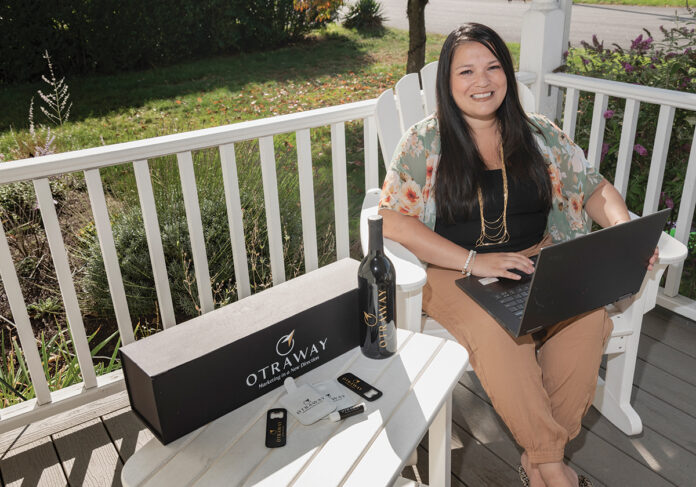(Editor’s note: This is the 15th installment in a monthly series speaking with minority business owners and leaders. Each will be asked their views on minority-business conditions in the state and for ways to improve those businesses’ chances for success.)
Amanda Mottola didn’t have much money and didn’t know many people when she relocated to Rhode Island in 2019 and soon established her one-person marketing firm.
“I started from nothing and knowing no one here,” said Mottola, 32, who was born in Paraguay but was adopted as a baby and grew up in Milford, Conn.
Mottola said she got her foot in the door of the state’s marketing industry through a chance connection that developed when she offered to donate $500 worth of marketing services from her company for a charity event held by the United Way of Rhode Island in April 2020.
The logo for her little-known company ended up sharing space on banners with big businesses that also donated to the cause, including FM Global, Cox Communications Inc., and National Grid Rhode Island. And the client that won Mottola’s $500 in services as a raffle prize, the nonprofit Partnership for Providence Parks, ended up becoming her biggest customer, providing $25,000 in revenue.
Mottola’s nontraditional approach led her to dub her marketing firm Otraway LLC, a combination of Spanish and English that can be translated to “other way.”
It’s a name that has defined her life, as a hard-working entrepreneur with a newborn baby, having grown up as an adopted child who later pursued her biological family during a trip to South America.
“People say you can’t have your cake and eat it too,” Mottola said. “I say the heck with that. I’m living it. I’m doing it. It’s super hard. But if there’s something you want, you just go get it.”
Otraway differentiates itself from other marketing firms by not only offering custom branded promotional products but also providing a strategic game plan to go with them, with preset goals for engagement. One example was a florist called Bloom Back Flowers LLC that Mottola worked with recently, providing the business with a box of branded lip balm sticks for distribution at local farmers markets. Those lip balm sticks were each made with lottery numbers on them, which the business used for a contest requiring participants to follow the business on its Instagram account.
“I told the florist that if she just got some branded pens, people will just throw them in a bag and that’ll be the end of it,” Mottola said. “She said, ‘I don’t know what else to do.’ That’s why you come to someone like me. I gave her a more effective option for the same price as pens.”
As an adopted child raised by non-Hispanic parents, Mottola said she has always tried to get in touch with her heritage, becoming involved with organizations such as the Spanish Community of Wallingford near Milford, and studying to improve her Spanish skills.
Throughout her life, Mottola said she’s encountered racism directed at her, including a condescending customer at a restaurant she worked for who acted like she didn’t understand English, yelling at her “more agua.” Mottola recalled attending a soccer game between the U.S. and Paraguay in Philadelphia in 2017. She decided to wear a Paraguay jersey, only to be harassed after the game.
“Someone on the street yelled, ‘Go back to your country. We don’t want you here,’ ” Mottola recalled. “I didn’t have a comeback. It kind of made me sad.”
The warwick-based entrepreneur said she has a second business venture that aims to be the soccer equivalent of the Harlem Globetrotters, called “Freestyle Football Club,” which is working with Major League Soccer teams and American colleges to recruit talent.
“I’m always go, go, go,” Mottola said. “When I do take a step back and think about what I’ve accomplished, I’m excited. It makes me feel really good about the future.”
1. Do you believe racism is keeping minorities from starting businesses in the Ocean State or succeeding when they do? Yes, racism does exist. Do I think it’s adversely affecting people from starting businesses in the U.S.? Absolutely not. I say that because I’ve seen other places, and comparatively, there’s opportunity here, opportunity that people in other countries can only dream of. You can see that at the border, with people trying to come into the country. It’s something people will die for. Xenophobia, racism and sexism all exist, but if you … get negative thoughts out of your head … that’s when the green lights start happening.
2. How dependent is your business on the support of other minority groups? Is that a sustainable business model? For me, at this point, I have some minority businesses I work with, but not enough. That’s one of my goals, to focus on partnering with more minority-owned businesses. One of my goals is to do more mentoring and partnering with minority-owned businesses to help them be successful. There could be opportunities.
3. What one thing could Rhode Island do to boost the odds for minority-owned business success? I think SCORE Rhode Island [a nonprofit volunteer mentorship network] is a great program. I definitely think making their mentorship program more robust to aid minorities would be a great start. Someone could also do this on their own, by creating a networking group, teaming up with a chamber of commerce and having them facilitate some cultural activities and events to attract minorities to learn about business.
4. Have you had to turn to an entity other than a bank for a loan? Do you believe the state’s lending institutions generally treat minorities fairly? I don’t really have experience with that. I built impeccable credit over the years, after not having great credit. I think there is a great opportunity for education for minorities on this topic, especially in school or early on. It would be a great deterrent for minorities if they don’t have the financial literacy that can help them be successful. There are probably issues with minorities getting financing, but it probably stems from educational inadequacies with financial literacy.
5. If another minority entrepreneur asked you where they could turn for support for their business, where would you direct them? I would say four key spots: Social Enterprise Greenhouse is great, SCORE Rhode Island and the Venture Cafe Providence [a community of innovators, entrepreneurs and small businesses], and also United Way, which has a young professional leadership group.
Marc Larocque is a PBN staff writer. Contact him at Larocque@PBN.com.













